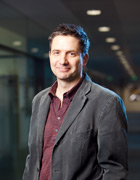 The Institute of Germanic Studies & Romance Studies has now re-launched as the Institute of Modern Languages Research, continuing its mission to promote and facilitate research in Modern Languages in the UK. We have been interviewing experts in the field to learn more about where modern languages research is heading, and what role the Institute will have. Nicholas Harrison is Professor of French and Postcolonial Studies at King’s college London.
The Institute of Germanic Studies & Romance Studies has now re-launched as the Institute of Modern Languages Research, continuing its mission to promote and facilitate research in Modern Languages in the UK. We have been interviewing experts in the field to learn more about where modern languages research is heading, and what role the Institute will have. Nicholas Harrison is Professor of French and Postcolonial Studies at King’s college London.
First of all thank you Nicholas for agreeing to talk with us. Could you tell us a little bit more about yourself?
I’m in the French department at King’s College London. My interests are fairly eclectic but a lot of my research and teaching are linked to colonial Algeria. I’m particularly interested at the moment in colonial education.
Why do you think that the study of modern languages is so important?
In the press, a lot of the rhetoric about why languages are important (which is tied to rhetoric about how they are at threat), is about gaining competitive advantages in an international marketplace. That’s not the side of language study I’m interested in, and I suspect that rhetoric is counterproductive when it comes to encouraging people to study languages at school. My interests are more in culture, and the way particular cultures, and world views, are carried in particular languages – which could mean literary language, or film, or French.
You spoke at the IMLR launch under the heading of ‘postcolonialism; translation and the transnational’. Could you tell us a bit more about what you talked about?
I talked about the ways in which something like ‘transnationalism’, or ‘world literature’, as academic categories, create perverse pressures away from language learning. To put it another way, I talked about translation; about the desirability of doing translations, and making things available in translation; and also about the reasons why we may still want to push the idea of reading in the original.
Is there anything else you would like to add?
Part of what I want to do is to try out some ideas about why translations should be taken more seriously as a form of research, for example in the context of the REF, or on tenure committees. I’m trying to get a sense of whether there would be support for some kind of campaign on this front.
Previous interviews about the re-launch of the Institute of Modern Languages Research: Paul Julian Smith part 1 and part 2; Charles Forsdick part 1 and part 2.
Nicholas Harrison can be found via his institutional profile page. For more information about the (re)launch of the Institute of Modern Languages Research (IMLR) check out the IMLR website or contact Dr Christopher Barenberg (e-mail: christopher.barenberg@sas.ac.uk; tel.: 020 7862 8738)
